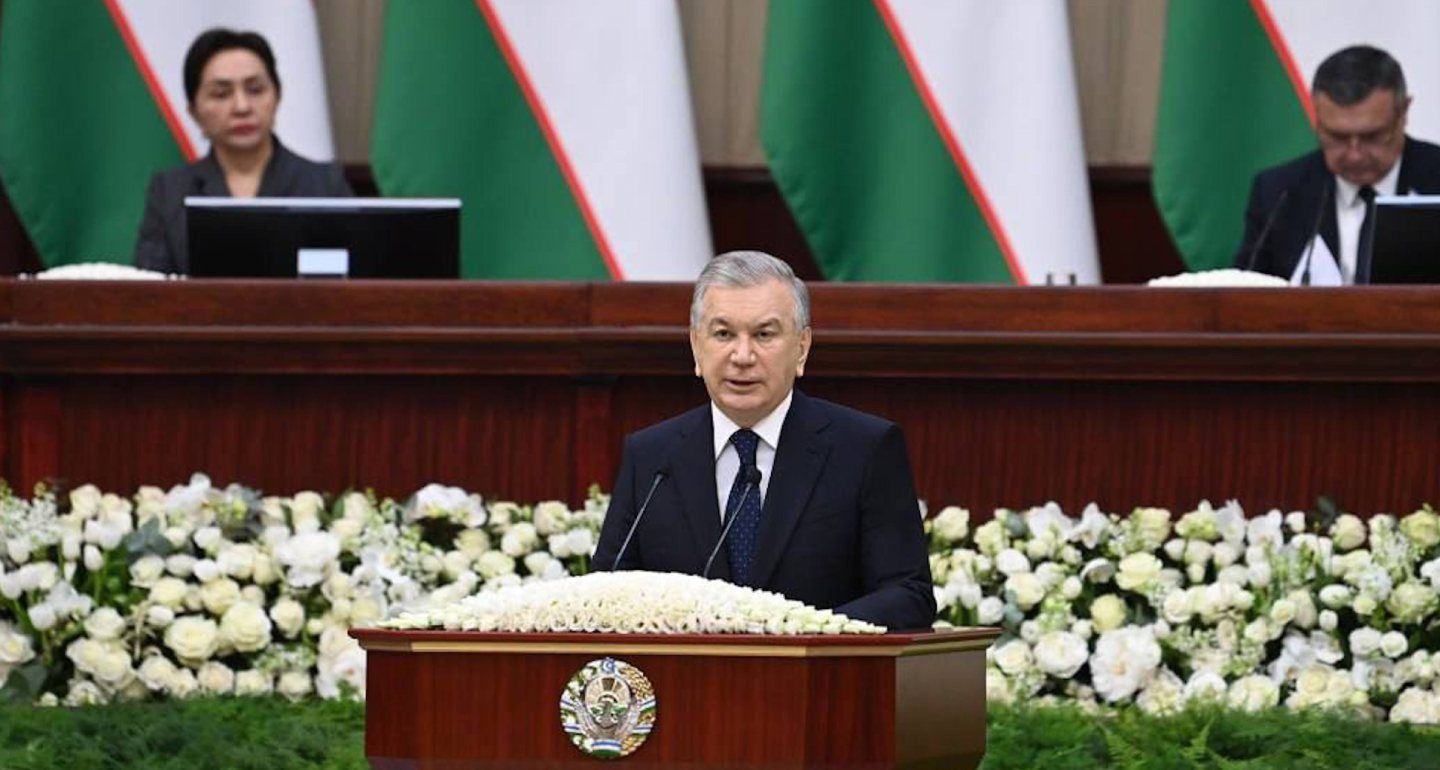Having failed to build a team that he can fully trust or establish strong state institutions, Mirziyoyev has become reliant on his family.
Galiya Ibragimova
{
"authors": [
"Galiya Ibragimova"
],
"type": "commentary",
"blog": "Carnegie Politika",
"centerAffiliationAll": "",
"centers": [
"Carnegie Endowment for International Peace",
"Carnegie Russia Eurasia Center"
],
"collections": [
"Aso Tavitian Initiative"
],
"englishNewsletterAll": "",
"nonEnglishNewsletterAll": "",
"primaryCenter": "Carnegie Russia Eurasia Center",
"programAffiliation": "",
"programs": [],
"projects": [],
"regions": [
"Uzbekistan",
"Central Asia",
"Russia"
],
"topics": [
"Domestic Politics",
"Political Reform",
"Security",
"Global Governance"
]
}
Source: Getty
The Uzbek leader has no one he can truly rely on: he doesn’t trust the Karimov-era officials; his own team is not yet strong enough; and his relatives are too busy fighting among themselves.
In Uzbekistan, there is suddenly talk of a transition of power, even though President Shavkat Mirziyoyev has been in office for a mere nine years: the blink of an eye by Central Asian standards. The speculation began after an assassination attempt on former presidential adviser Komil Allamjonov the day after he presented Mirziyoyev with a report on the growing struggle for power within the elite. The finger has been pointed at the president’s son-in-law Otabek Umarov, who was deputy head of Mirziyoyev’s personal security service for many years. Allegedly, Umarov has his sights on his father-in-law’s seat, and ordered the hit on Allamjonov because he posed a threat to those plans.
There is still much that is unclear about what happened, but what is clear is that a fierce battle is raging within the Uzbek government, pitting even the president’s closest relatives against each other.
In Uzbekistan’s entire post-Soviet independence, the country has never seen any political assassination attempts. So when the Prosecutor General’s Office reported in October 2024 that two men had opened fire on Allamjonov’s car in a Tashkent suburb, it was the country’s biggest news story for a long time.
A former presidential press secretary and deputy head of the presidential administration, Allamjonov is generally considered to be the architect of Uzbekistan’s new media policy. He developed the concept of “information openness,” which was supposed to cement the president’s public image as a progressive leader open to dialogue with journalists, bloggers, and activists.
The strategy was a success, and Mirziyoyev gained a reputation as a reformer ready to lead the country out of the stagnation that had set in during the quarter-century rule of his predecessor, Islam Karimov. But a few months before the assassination attempt, Allamjonov resigned from all his positions, which seemed very strange given his ambition and long-running close relationship with the president.
Allamjonov is also considered a political mentor to Saida Mirziyoyeva, the president’s eldest daughter. Her official title is presidential aide, but in reality, she runs the presidential administration. Saida began her political career at the Agency for Information and Mass Communications under Allamjonov’s leadership. They then worked together at the Public Foundation for the Support and Development of Mass Media of Uzbekistan, after which they maintained a trusting relationship.
The attempt to assassinate someone so close to the presidential family inevitably prompted a major fallout in Uzbekistan. The public scandal only grew when two months after the attack, Ramzan Kadyrov, the controversial leader of Russia’s Chechen republic, took to his Telegram channel to publicly deny reports of Chechen involvement (had he been responsible, he clarified, he would have “seen it through to the end that same day”).
Kadyrov also expressed doubt about the alleged involvement of Umarov, the husband of Mirziyoyev’s youngest daughter Shahnoza, saying that was as likely as aliens landing in the Chechen capital Grozny. He ended his Telegram post with a thinly veiled threat against Allamjonov, telling him he would have to answer “according to our [Chechen] traditions” for “all the slander and speculation.”
At the same time, Kadyrov’s post made it very clear that he does personally know Umarov, describing him as a loyal person who treats his father-in-law—the president—with great respect. Kadyrov has visited Uzbekistan twice—in 2017 and 2024—and both times he was greeted and accompanied by Umarov.
Kadyrov’s strongly worded comments about the assassination attempt on Allamjonov came after Uzbekistan’s Prosecutor General declared two Russian nationals wanted in connection with the attack: Bislan Rasayev and Shamil Temirkhanov. Both are from Chechnya. According to investigators, the Russians were offered $1.5 million to murder Allamjonov. After the failed assassination attempt, the Chechens’ cars were found in the Uzbek city of Fergana, near a nightclub whose owners are connected to Umarov. Accordingly, the president’s son-in-law started being mentioned in connection with the assassination attempt.
One month after the attack, Umarov was removed from his post as deputy head of the Presidential Security Service, which he had held for almost all of Mirziyoyev’s time in power. The head of the State Security Service—Uzbekistan’s main security agency—and a number of other high-ranking security officials with ties to Umarov were also dismissed.
It is believed that Umarov sought to become the informal curator of the country’s security bloc, initially with Mirziyoyev’s blessing. At the start of his rule, the new president needed as many of his own people as possible in security posts in order to topple his main rival, the longtime security chief under Karimov: Rustam Inoyatov.
However, Umarov soon stopped acting in the interests of his father-in-law, and instead began to build his own power vertical, advancing his political and business interests. He became the owner of major assets in banking, real estate, oil and gas, pharmaceuticals, and sugar production. Umarov was widely assumed to have his sights on the presidency and to be making plans to replace his father-in-law.
What supposedly happened next is that in order to prevent the family of the president’s youngest daughter from becoming too powerful, his eldest daughter Saida intervened. Together with her longtime ally Allamjonov, she drew up a report for her father about how Umarov and his “office” had begun to gain too much influence. The report was swiftly followed by Umarov’s resignation and the assassination attempt against Allamjonov.
It might seem that Mirziyoyev, who has put so much effort into distancing himself from Karimov’s legacy, should have learned from his predecessor’s mistakes and not allowed his relatives to become actively involved in running the country. After all, he witnessed firsthand the downfall of Karimov’s daughter Gulnara, who first built an entire empire on corruption and then ended up behind bars when she tried to interfere in politics.
At the start of his presidency, Mirziyoyev’s close relatives were seemingly the only people he truly trusted, and so nearly all of them soon found themselves involved in politics. Those family members included his eldest daughter Saida and her husband Oybek Tursunov. The latter rose through the presidential administration to head the financial and economic department, and is now focused on business, while his father, General Batyr Tursunov, is both head of the National Guard and first deputy chairman of the State Security Service.
Although Mirziyoyev’s wife, Ziroat Hoshimova, is formally involved in charity work, not a single key political appointment is made without her approval. It was Hoshimova who lobbied for the promotion of her son-in-law Umarov. Umarov’s wife, Shahnoza Mirziyoyeva, herself oversees the National Agency for Social Security. Many other relatives of Mirziyoyev aren’t directly involved in politics, but own major business assets and industrial enterprises.
Of course, over time, Mirziyoyev tried to form his own team of managers. He has recruited young specialists in economics, finance, and IT. Indeed, Allamjonov himself was one such representative of this new generation of managers, but the attempt on his life shows that the president’s relatives are not prepared to give up their positions without a fight. To complicate matters further, a struggle for power and influence has broken out within the president’s family itself.
As a result, the system of power built by Mirziyoyev over his almost decade-long presidency has turned out to be far more fragile than it looks from the outside. The upshot is that the Uzbek leader has no one he can truly rely on: he doesn’t trust the old Karimov-era officials; his own team is not yet strong enough; and his relatives are busy fighting among themselves.
Carnegie does not take institutional positions on public policy issues; the views represented herein are those of the author(s) and do not necessarily reflect the views of Carnegie, its staff, or its trustees.
Having failed to build a team that he can fully trust or establish strong state institutions, Mirziyoyev has become reliant on his family.

Galiya Ibragimova
Insisting on Zelensky’s resignation is not just a personal vendetta, but a clear signal that the Kremlin would like to send to all its neighbors: even if you manage to put up some resistance, you will ultimately pay the price—including on a personal level.

Vladislav Gorin
For Putin, upgrading Russia’s nuclear forces was a secondary goal. The main aim was to gain an advantage over the West, including by strengthening the nuclear threat on all fronts. That made growth in missile arsenals and a new arms race inevitable.

Maxim Starchak
For a real example of political forces engaged in the militarization of society, the Russian leadership might consider looking closer to home.

James D.J. Brown
The risk posed by Lukashenko today looks very different to how it did in 2022. The threat of the Belarusian army entering the war appears increasingly illusory, while Ukraine’s ability to attack any point in Belarus with drones gives Kyiv confidence.

Artyom Shraibman